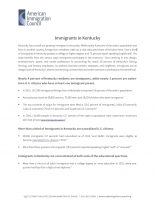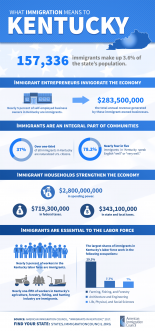- Fact Sheet
Immigrants in Kentucky
Published
Kentucky has a small but growing immigrant community. While 4 percent of the state’s population was born in another country, foreign-born residents make up a vital, educated share of the labor force. A third of immigrants in Kentucky possess a college or higher degree, and three-fourths report speaking English well. The state also benefits from the various ways immigrants participate in the economy—from working in arts, design, entertainment, sports, and media professions to accounting for 17 percent of Kentucky’s fishing, farming, and forestry employees. As neighbors, business owners, taxpayers, and workers, immigrants are an integral part of Kentucky’s diverse and thriving communities and make extensive contributions that benefit all.
Four percent of Kentucky residents are immigrants, while 3 percent of residents are native-born U.S. citizens with at least one immigrant parent.
- In 2018, 169,346 immigrants (foreign-born individuals) comprised 4 percent of the population.
- Kentucky was home to 75,440 women, 78,639 men, and 15,267 children who were immigrants.
- The top countries of origin for immigrants were Mexico (16 percent of immigrants), Cuba (7 percent), China (6 percent), India (5 percent), and Honduras (4 percent).
- In 2018, 111,946 people in Kentucky (3 percent of the state’s population) were native-born Americans who had at least one immigrant parent.
Two out of five immigrants in Kentucky are naturalized U.S. citizens.
- 68,807 immigrants (41 percent) had naturalized as of 2018, and 33,829 immigrants were eligible to become naturalized U.S. citizens in 2017.
- Three in four (76 percent) immigrants reported speaking English “well” or “very well.”
Immigrants in Kentucky are distributed across the educational spectrum.
- One-third (33 percent) of adult immigrants had a college degree or more education in 2018, while one-fourth (25 percent) had less than a high school diploma.
|
Education Level |
Share (%) of All Immigrants |
Share (%) of All Natives |
|---|---|---|
|
College degree or more |
33 |
24 |
|
Some college |
19 |
30 |
|
High school diploma only |
23 |
33 |
|
Less than a high school diploma |
25 |
13 |
|
Source: U.S. Census Bureau, 2018 American Community Survey 1-Year Estimates. |
||
More than 24,000 U.S. citizens in Kentucky live with at least one family member who is undocumented.
- 35,000 undocumented immigrants comprised 22 percent of the immigrant population and 1 percent of the total state population in 2016.
- 56,157 people in Kentucky, including 24,250 U.S. citizens, lived with at least one undocumented family member between 2010 and 2014.
- During the same period, about 2 percent of children in the state were U.S. citizens living with at least one undocumented family member (19,713 children in total).
Kentucky is home to thousands of Deferred Action for Childhood Arrivals (DACA) recipients.
- 2,710 active DACA recipients lived in Kentucky as of March 2020, while DACA has been granted to 3,277 people in total since 2012.
- As of 2019, 62 percent of DACA-eligible immigrants in Kentucky had applied for DACA.
- Fewer than 2,000 residents of the state would satisfy all but the educational requirements for DACA, and fewer than 1,000 would become eligible as they grew older.
Immigrants are vital members of Kentucky’s labor force across industries.
- 107,721 immigrant workers comprised 5 percent of the labor force in 2018.
- Immigrant workers were most numerous in the following industries:
|
Industry |
Number of Immigrant Workers |
|---|---|
|
Manufacturing |
22,777 |
|
Retail Trade |
15,648 |
|
Accommodation and Food Services |
14,910 |
|
Construction |
10,657 |
|
Health Care and Social Assistance |
10,361 |
|
Source: Analysis of the U.S. Census Bureau’s 2018 American Community Survey 1-year PUMS data by the American Immigration Council. |
|
- The largest shares of immigrant workers were in the following industries:
|
Industry |
Immigrant Share (%) |
|---|---|
|
Management of Companies and Enterprises |
10 |
|
Agriculture, Forestry, Fishing, and Hunting |
10 |
|
Accommodation and Food Services |
8 |
|
Wholesale Trade |
7 |
|
Manufacturing |
7 |
|
Source: Analysis of the U.S. Census Bureau’s 2018 American Community Survey 1-year PUMS data by the American Immigration Council. |
|
Immigrants are an integral part of the Kentucky workforce in a range of occupations.
- In 2018, immigrant workers were most numerous in the following occupation groups:
|
Occupation Category |
Number of Immigrant Workers |
|---|---|
|
Production |
15,995 |
|
Transportation and Material Moving |
12,510 |
|
Office and Administrative Support |
12,321 |
|
Food Preparation and Serving Related |
10,219 |
|
Building and Grounds Cleaning & Maintenance |
9,455 |
|
Source: Analysis of the U.S. Census Bureau’s 2018 American Community Survey 1-year PUMS data by the American Immigration Council. |
|
- The largest shares of immigrant workers were in the following occupation groups:
|
Occupation Category |
Immigrant Share (%) |
|---|---|
|
Farming, Fishing, and Forestry |
17 |
|
Life, Physical, and Social Science |
11 |
|
Computer and Mathematical |
10 |
|
Building and Grounds Cleaning & Maintenance |
10 |
|
Production |
7 |
|
Source: Analysis of the U.S. Census Bureau’s 2018 American Community Survey 1-year PUMS data by the American Immigration Council. |
|
- Undocumented immigrants comprised 1 percent of Kentucky’s workforce in 2016.
Immigrants in Kentucky have contributed over a billion dollars in taxes.
- Immigrant-led households in the state paid $900.7 million in federal taxes and $465.2 million in state and local taxes in 2018.
- Undocumented immigrants in Kentucky paid an estimated $83.2 million in federal taxes and $53.3 million in state and local taxes in 2018.
- Kentucky DACA recipients and DACA-eligible individuals paid an estimated $8.1 million in state and local taxes in 2018.
As consumers, immigrants add billions of dollars to Kentucky’s economy.
- Kentucky residents in immigrant-led households had $3.6 billion in spending power (after-tax income) in 2018.
Immigrant entrepreneurs in Kentucky generate hundreds of millions of dollars in business revenue.
- 11,238 immigrant business owners accounted for 6 percent of all self-employed Kentucky residents in 2018 and generated $321.4 million in business income.
- In 2018, immigrants accounted for 9 percent of business owners in the Cincinnati/Middleton metropolitan area (which spans Ohio, Kentucky, and Indiana).
Help us fight for immigration justice!
The research is clear – immigrants are more likely to win their cases with a lawyer by their side. But very few can get attorneys.
Introducing the Immigration Justice Campaign Access Fund.
Your support sends attorneys, provides interpreters, and delivers justice.

Immigration Justice Campaign is an initiative of American Immigration Council and American Immigration Lawyers Association. The mission is to increase free legal services for immigrants navigating our complicated immigration system and leverage the voices and experiences of those most directly impacted by our country’s immigration policies to inform legal and advocacy strategies. We bring together a broad network of volunteers who provide legal assistance and advocate for due process for immigrants with a humane approach that includes universal legal representation and other community-based support for individuals during their immigration cases.


